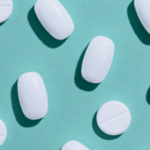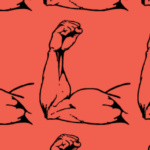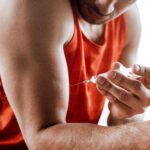They make headlines when sports stars are caught out, and they’re a topic of speculation when someone’s bulked up quickly — but how much do you really know about steroids? From how they work to common side effects, we’re explaining everything you need to know.
A quick explainer
Steroids are hormones that are naturally made by the human body. But we also use the term steroids when we’re talking about the man-made versions of these hormones.
There are different types of steroids: examples are corticosteroids (which are the effective ingredients in steroid creams used to treat skin rashes) and androgenic steroids, which we’re about to discuss.
What are androgenic steroids?
You might see steroids also called anabolic-androgenic steroids, anabolic steroids, androgenic steroids, testosterone replacement therapy, roids, gear or juice.
Although they’re not exactly the same, they essentially refer to the same thing — a manufactured version of testosterone that imitates its effects on the body. We’ll use the term steroids here because that’s what a lot of people are familiar with.
Testosterone is the main androgenic steroid (a type of hormone) in men. It’s also present in women but in much smaller amounts.
Testosterone is responsible for the physical changes that happen during male puberty, and it regulates sperm production, bone health, muscle mass and sex drive.
Normal levels of testosterone are important for development and overall wellbeing.
What are steroids used for?
In Australia, steroids can be prescribed by a doctor for medical purposes like treating androgen deficiency (low testosterone) or as part of gender-affirming treatment.
However, steroids can also be misused and abused for a range of reasons. The correct terminology is androgen misuse and androgen abuse.
What is steroid misuse?
Misuse is the use of steroids for a medical reason that is not valid. This could be in a misguided attempt to treat sexual dysfunction (that’s unrelated to legitimate androgen deficiency), perceived “low T” or “male menopause”, or managing non-specific symptoms like tiredness.
Men are targeted with advertisements and articles about testosterone’s benefits and how to boost their levels.
It’s pushed as a cure-all for a range of men’s health issues including everything from sex drive to exhaustion, when that’s not often the case. If you’re experiencing symptoms of low testosterone, go to see your doctor.
They’ll discuss your symptoms, general health and habits, do a physical examination and order further testing if needed. An accurate diagnosis will help you find the right treatment.
What is steroid abuse?
Steroid abuse is the use of steroids for performance or image-enhancing reasons like improving athletic ability and building muscle.
Steroid abuse often involves massive doses of illegally sourced drugs, that provide a vastly higher level of hormones than required for legitimate testosterone replacement therapy.
They’re often used in combination with other performance and image-enhancing drugs (this is called “stacking”) as well as drugs to counter the side effects of steroids.
People also “cycle” their use with breaks for “recovery”, and “pyramid” use by gradually increasing intake to a peak and reducing again.
However, there is no evidence that any of these methods actually reduce side effects and harm from taking steroids.
We don’t know exactly how many people abuse steroids, but it’s estimated that around one to five per cent of the population will do it in their lifetime.
While steroids used to be associated with competitive athletes and bodybuilders, they’re now used by recreational athletes and gymgoers, people who need muscle strength to do their job like bodyguards, security personnel, construction workers, police and members of the armed services.
Men and boys with muscle dysmorphia (a type of body dysmorphic disorder) see themselves as not muscular enough and can abuse steroids in a bid to fix this perceived flaw.
Men with muscle dysmorphia don’t recognise that their beliefs about their appearance are inaccurate and may not realise they have a serious but treatable condition.
What are the side effects of steroid abuse?
Steroid abuse carries significant health risks such as cardiovascular disease, liver and brain damage and infertility. In adolescents, steroids can cause premature ageing and stunted growth.
If you’re injecting steroids, you’re also at risk of contracting blood-borne viruses such as HIV, tetanus or Hepatitis C or B.
Injecting can also cause abscesses (a pocket of pus) and blood clots if the technique is incorrect or you’re repeatedly injecting the same area.
What happens when you stop taking steroids?
When taking steroids, you’re overriding your body’s production of testosterone. When you stop steroid misuse or abuse, it takes your body weeks to months to get back to making its own testosterone.
Many men who abuse steroids decide to stop when they want to recover their fertility to start or grow their family. It usually takes around six to 18 months for fertility to return.
People can become dependent on steroids, especially when they’re relied on for confidence and self-esteem.
Withdrawing from steroids can be incredibly tough, and the effects include headache, tiredness, nausea, muscle pain, restlessness, poor sleep, low mood, low sex drive, body dysmorphia and suicidal thoughts.
If you’re misusing or abusing steroids and want to stop, be honest with your doctor to get the right support. But the best option is to never start.















